Back to Hui Members
Maui School Garden Network
Visit the Web site.
A program that helps Maui’s children take up their kuleana (responsibility) to develop a greater sense of food security, as well as promote understanding of nutrition on Maui by teaching our children how to grow their own food in sustainable school gardens and by promoting a direct connection between local food producers and our school food service providers for all K-12 schools, charter, independent and public.
What do we do?
• Network with 15 agencies on Maui to promote the MSGN mission
• Provide access to equipment and resources that will help make school gardens successful
• Connect schools with farm fieldtrip opportunities
• Connect schools with grant opportunities
• Help provide professional development in gardening and agriculture to teachers and community volunteers
• Help solve issues that relate to the successful implementation and development of sustainable school gardens and farm to school programs
• Connect teachers to learn from each other through regional school garden tours
Two Major Partners
(1) UHMC – Sustainable Living Institute of Maui (SLIM) Program
SLIM offers educational facilities, professional training, and a new on-site community garden open for schools and community organizations to enhance their understanding of how to work with seeds, soils, and other aspects of successful gardening and sustainable agriculture. MSGN also works with SLIM to enhance articulation of interested high school students into UHMC degree-granting programs in the sustainable sciences, agriculture, and human resources. Other agencies on the UHMC campus that assist with education and training are the College of Tropical Agriculture and Human Resources and the Agriculture Department.
(2) Community Work Day Program
Community Work Day helps to put in new school gardens, provides curricular assistance in managing the gardens and integrating garden learning into the core disciplines, and helps to organize community volunteer work days to support school garden maintenance.
How can you be a part of growing the Maui school garden community?
• Sign up to volunteer time as a garden worker
• Assist with fundraising activities for garden maintenance
• Assist with maintaining a facebook page and website
• Assist with registration and resource tables at MSGN/CWD workshops
• Help design brochures, flyers, and posters for educational events
• Help identify equipment and other garden related donations
• Provide video and photography skills to get the word out about the farm to school connections
• Adopt a school garden program and become a liaison to MSGN/CWD
Contact
Rebekah Kuby
Resilient Gardens-Grow-Resilent-Communities
Community Work Day Program
E-mail: Rebekah@cwdhawaii.org
Tel: 808-344-7187
Lehn Huff
Maui School Garden Network
E-mail: msgn@hawaii.rr.com
Tel:
808-250-8323
Photos
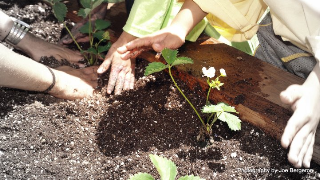 Hands in the soil around a newly planted strawberry plant. We are planting more than seeds here on Maui. We are planting hope. We are planting health. We are planting cooperation. We are teaching children what it feels like to care for the land, we are teaching them the valuable lessons of giving and feeding the land before we take from it. When we are in the garden we are transformed in some small way. Sometimes we feel it immediately...the fresh air, being physically and mentally engaged and active, smelling the smells of the soil, the flowers, the herbs, hearing the sounds of birds and wildlife and laughter. Sometimes, it happens much later...hours, days, or months later that we realize while in the garden we became guardians of the land. We became teachers, mothers, mentors. The garden in its greatest potential can become a doorway, a portal...it has the ability to teach us, to inspire us, to give us a place of peace and safety, it feeds us, nourishes us, and empowers us in ways that are so often overlooked.
Hands in the soil around a newly planted strawberry plant. We are planting more than seeds here on Maui. We are planting hope. We are planting health. We are planting cooperation. We are teaching children what it feels like to care for the land, we are teaching them the valuable lessons of giving and feeding the land before we take from it. When we are in the garden we are transformed in some small way. Sometimes we feel it immediately...the fresh air, being physically and mentally engaged and active, smelling the smells of the soil, the flowers, the herbs, hearing the sounds of birds and wildlife and laughter. Sometimes, it happens much later...hours, days, or months later that we realize while in the garden we became guardians of the land. We became teachers, mothers, mentors. The garden in its greatest potential can become a doorway, a portal...it has the ability to teach us, to inspire us, to give us a place of peace and safety, it feeds us, nourishes us, and empowers us in ways that are so often overlooked.
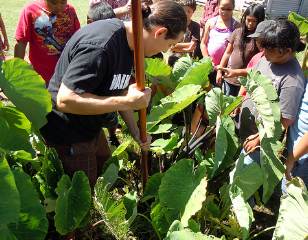 Hōkūao Pellegrino with students at Lokelani School. When I first started teaching in the gardens, I began by asking the students a very simple question: "How many of you grow your own food at home?" I was lucky if one or two hands would raise. Then I would ask, "How many of your grandparents grew their own food?" and most of the hands would go up instantly. That is a lot of skill sharing to lose in just two generations. Hawai‘i use to be 100% self-sufficient, and has now gone to 93% reliant on the importation of food. One of the greatest connections that can happen through a garden is skill sharing between the generations. Planting more than just seeds in the ground...we are planting seeds within the very heart of the children...reminding them of their heritage, and
Hōkūao Pellegrino with students at Lokelani School. When I first started teaching in the gardens, I began by asking the students a very simple question: "How many of you grow your own food at home?" I was lucky if one or two hands would raise. Then I would ask, "How many of your grandparents grew their own food?" and most of the hands would go up instantly. That is a lot of skill sharing to lose in just two generations. Hawai‘i use to be 100% self-sufficient, and has now gone to 93% reliant on the importation of food. One of the greatest connections that can happen through a garden is skill sharing between the generations. Planting more than just seeds in the ground...we are planting seeds within the very heart of the children...reminding them of their heritage, and
inspiring them to once again be a part of this land in which they live.
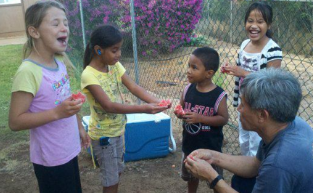 Dr. Pang with school children at Ka Hale A Ke Ola eating their first-ever grapefruit. There are not words to express the joy I feel watching a child with innocent curiosity try a vegetable or piece of fruit right out of the garden for the first time. I always heard that if children take part in growing the food they will eat it, but I never imagined that it would be to this great of an extent. I have watched students stand in line after school to gather napkins full of fresh raw beets, carrots, cucumbers and radishes. I have heard them beg for more "green juice," and watch as their faces delight and pucker to taste the very first bite of a locally grown grapefruit. Food has a way of bringing people together. Nourishing food has a way of changing peoples lives. This is one of the greatest rewards in this job is to see the wonderful people of Maui nourished through the gardens that they put so much love, time and energy into creating.
Dr. Pang with school children at Ka Hale A Ke Ola eating their first-ever grapefruit. There are not words to express the joy I feel watching a child with innocent curiosity try a vegetable or piece of fruit right out of the garden for the first time. I always heard that if children take part in growing the food they will eat it, but I never imagined that it would be to this great of an extent. I have watched students stand in line after school to gather napkins full of fresh raw beets, carrots, cucumbers and radishes. I have heard them beg for more "green juice," and watch as their faces delight and pucker to taste the very first bite of a locally grown grapefruit. Food has a way of bringing people together. Nourishing food has a way of changing peoples lives. This is one of the greatest rewards in this job is to see the wonderful people of Maui nourished through the gardens that they put so much love, time and energy into creating.
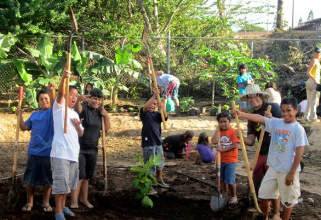 Kids at Hui Malama and Ka Hale A Ke Ola. These gardens are for the children of Maui...and throughout this past year I have found that the children are really the most remarkable volunteers. They are not volunteering for community service, or as part of an act of service in any way. They do not get extra credit for being there, nor has anyone asked them to come and "help." They literally go out to the garden to work, to play, to grow, to share. What is said in the garden stays in the garden...there is safety and confidentiality for all who enter. It is a place where they see how valuable they are. They are encouraged and appreciated and valued. And at the end of the day when the sun is going down, they literally beg to work in the garden for "five more minutes please phullleaseee."...and there is no saying no to that.
Kids at Hui Malama and Ka Hale A Ke Ola. These gardens are for the children of Maui...and throughout this past year I have found that the children are really the most remarkable volunteers. They are not volunteering for community service, or as part of an act of service in any way. They do not get extra credit for being there, nor has anyone asked them to come and "help." They literally go out to the garden to work, to play, to grow, to share. What is said in the garden stays in the garden...there is safety and confidentiality for all who enter. It is a place where they see how valuable they are. They are encouraged and appreciated and valued. And at the end of the day when the sun is going down, they literally beg to work in the garden for "five more minutes please phullleaseee."...and there is no saying no to that. 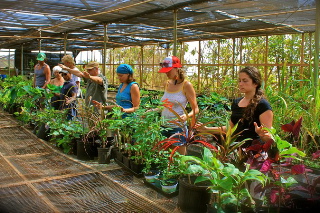
We recognize that we are planting more than just plants in the ground here. I always say that we are creating a revolution in disguise as a garden. We are planting hope in these sites, we are planting seeds that generations to come will eat from, we are planting dreams, planting inspiration, planting prayers.
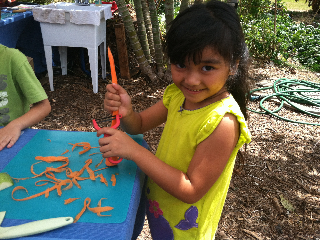
We are connecting children at a young age to REAL food. They are learning where food comes from, and why they want to eat it. For many children, vegetables use to be a punishment that they had to suffer through in order to eat dessert...we are empowering children to understand why they want to eat vegetables, and what it does for their bodies. We are making food exciting again. I literally have had students come up to me at school to tell me how many colors of the rainbow they ate that day. I have parents call me to tell me that their kids came home asking for salad with liliko‘i dressing. I cannot even begin to explain why this method works the way it does, but I have seen it proven again and again...that if the kids grow it, they will eat it. When children get their palate introduced to nutrient-dense food at a young age, it is proven that they will be healthier eaters for life. So that when they are 30 and 40 they will not be having to counteract 30 years of bad-food addiction to try and get onto a healthy diet. It will already be a part of their lives.
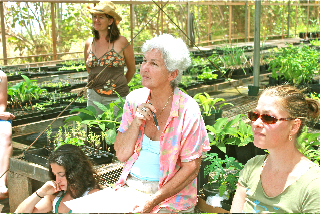 Our Greenhouse is one thing that really sets the Maui School Garden movement apart in that we are creating lasting sustainability of our garden programs. We have the greenhouse as a space for classes and field trips to visit weekly to begin their own seeds, to be able to watch their seeds grow week by week, we have an outdoor planting space where we test seeds and soils and where we can save our best seeds for the future. And because of the greenhouse, we are able to give away hundreds of starts to our school gardens, and to children to take home where they can encourage their families to start gardens at home. This is how the movement really spreads. To integrate the valuable lesson of "giving back" we also provide free classes, demos and lessons to our schools, homeless shelters and volunteers at the greenhouse at least once a month where they can learn valuable skills from how to make value-added products, to their own locally sourced amendments and fertilizers. The greatest outreach we can have is by actively engaging our community to grow with us...to help this to become a movement whether that is just in their own backyards at home or by helping to sponsor their local school garden...because it really does take community to raise a garden.
Our Greenhouse is one thing that really sets the Maui School Garden movement apart in that we are creating lasting sustainability of our garden programs. We have the greenhouse as a space for classes and field trips to visit weekly to begin their own seeds, to be able to watch their seeds grow week by week, we have an outdoor planting space where we test seeds and soils and where we can save our best seeds for the future. And because of the greenhouse, we are able to give away hundreds of starts to our school gardens, and to children to take home where they can encourage their families to start gardens at home. This is how the movement really spreads. To integrate the valuable lesson of "giving back" we also provide free classes, demos and lessons to our schools, homeless shelters and volunteers at the greenhouse at least once a month where they can learn valuable skills from how to make value-added products, to their own locally sourced amendments and fertilizers. The greatest outreach we can have is by actively engaging our community to grow with us...to help this to become a movement whether that is just in their own backyards at home or by helping to sponsor their local school garden...because it really does take community to raise a garden.
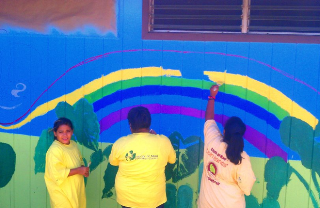
At what point does a garden become more than just a garden? Is it when the transformation takes place? Is it when you hear a child say for the first time...."this is the best thing i have ever done"...or when you watch them learn a new skill or fall in love with a new hobby? Is it when the garden becomes a place of refuge? A place of joy? When color is brought in, and intention is planted? Is it when a fallen log becomes a "friendship bench," where the children can come and talk about what is on their mind? Is it when a child who has been made fun of at school for being "homeless" gets to plant their plant into the ground and as their hands pat the new seedling in place they sing "Welcome Home" to their new plant?
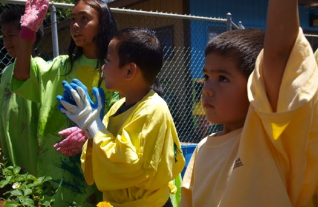 |
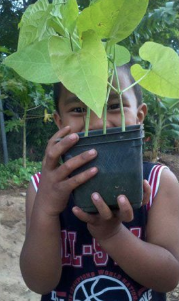 |
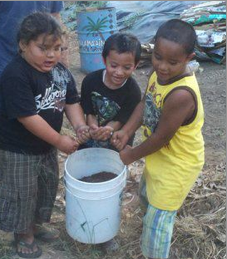 |
There is nothing like watching a child become fully engaged with wonder through a garden.Working in the garden teaches values that can only truly be understood by practice. Kōkua in its truest form.